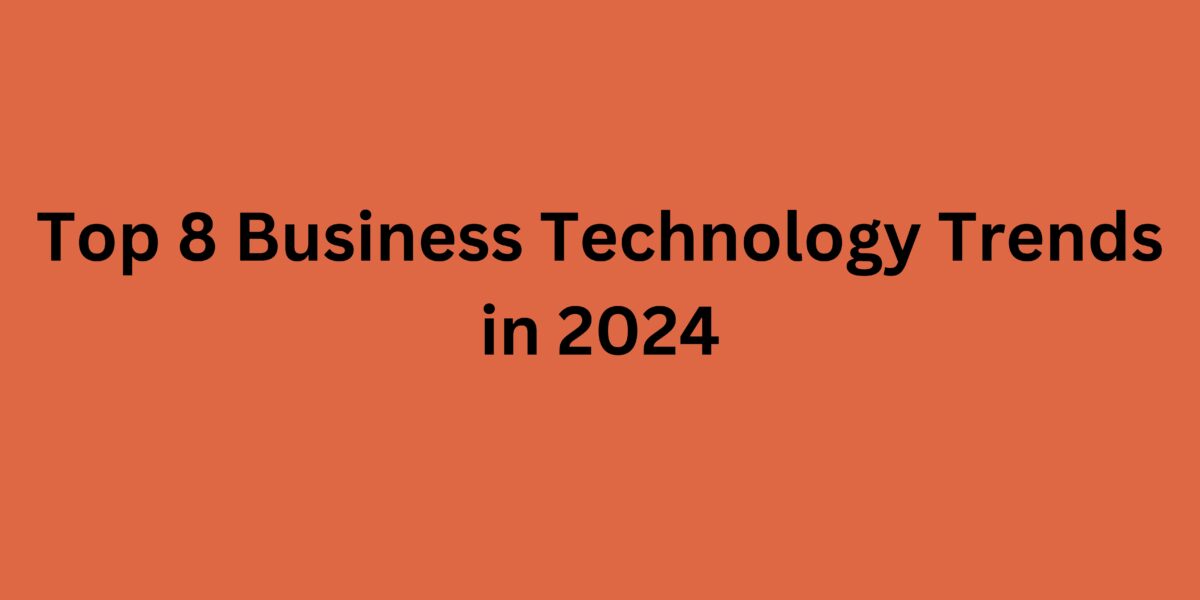As we venture deeper into the digital age, businesses must stay ahead of the curve to maintain their competitive edge. The landscape is evolving rapidly, and technology is at the forefront of this transformation. Here are the top 8 business technology trends in 2024 that are set to revolutionize industries and redefine the way we work.
1. Artificial Intelligence and Machine Learning
Artificial Intelligence (AI) and Machine Learning (ML) continue to dominate the business technology scene. In 2024, these technologies are expected to become even more sophisticated and integrated into various business processes. Companies are leveraging AI and ML to enhance customer experiences, optimize operations, and drive innovation.
AI-powered chatbots and virtual assistants are becoming more advanced, providing personalized customer service around the clock. Predictive analytics, powered by ML algorithms, are enabling businesses to anticipate market trends and customer needs more accurately, allowing for better decision-making and strategic planning.
Moreover, AI and ML are driving automation in industries such as manufacturing, healthcare, and finance. From automating routine tasks to providing advanced data analytics, these technologies are streamlining operations and reducing costs.
2. 5G and Enhanced Connectivity
The rollout of 5G networks is set to revolutionize business operations in 2024. With significantly faster data speeds and lower latency, 5G will enable more reliable and seamless connectivity. This enhanced connectivity will support a myriad of applications, from IoT devices to augmented reality (AR) and virtual reality (VR) experiences.
For businesses, 5G means improved remote work capabilities, more efficient supply chain management, and enhanced customer engagement. The ability to transmit large amounts of data quickly and reliably will also spur innovation in areas like smart cities, autonomous vehicles, and advanced robotics.
3. Edge Computing
Edge computing is gaining traction as businesses look for ways to process data closer to its source. This trend is driven by the increasing adoption of IoT devices, which generate vast amounts of data that need to be processed in real-time.
By decentralizing data processing, edge computing reduces latency and improves the speed of data analysis. This is particularly beneficial for industries like manufacturing, where real-time data analysis is critical for monitoring equipment and ensuring operational efficiency. In retail, edge computing can enhance customer experiences by providing personalized recommendations and faster transaction processing.
4. Cybersecurity Enhancements
As businesses become more digital, cybersecurity threats are becoming more sophisticated. In 2024, companies are expected to invest heavily in advanced cybersecurity measures to protect their data and systems from cyberattacks.
The rise of AI in cybersecurity is a notable trend, with AI-powered tools being used to detect and respond to threats more quickly and accurately. Additionally, businesses are adopting zero-trust security models, which assume that threats can exist both inside and outside the network. This approach requires strict identity verification and access controls, minimizing the risk of data breaches.
Furthermore, with the growing reliance on cloud services, securing cloud environments is becoming a top priority. Businesses are implementing advanced encryption, multi-factor authentication, and regular security audits to safeguard their cloud infrastructure.
5. Quantum Computing
Quantum computing is on the horizon, promising to solve complex problems that are beyond the capabilities of classical computers. While still in its early stages, quantum computing is expected to make significant strides in 2024.
Businesses in industries such as finance, healthcare, and logistics are exploring quantum computing for its potential to optimize algorithms, enhance data encryption, and accelerate drug discovery. Although widespread commercial use is still a few years away, early adopters are gaining a competitive edge by preparing for the quantum revolution.
6. Sustainability and Green Technology
Sustainability is no longer a buzzword; it’s a business imperative. In 2024, companies are expected to prioritize green technology and sustainable practices to reduce their environmental footprint.
Businesses are investing in renewable energy sources, such as solar and wind power, to decrease their reliance on fossil fuels. Additionally, the development of energy-efficient technologies, such as low-power IoT devices and energy-saving data centers, is helping companies reduce their carbon emissions.
Sustainable practices are also being integrated into supply chains, with businesses adopting circular economy principles to minimize waste and promote recycling. Consumers are increasingly favoring companies that demonstrate a commitment to sustainability, making it a key factor in building brand loyalty and trust.
7. Augmented Reality (AR) and Virtual Reality (VR)
AR and VR technologies are transforming the way businesses operate and interact with customers. In 2024, these immersive technologies are expected to become more mainstream, offering new opportunities for innovation and engagement.
In retail, AR is enhancing the shopping experience by allowing customers to visualize products in their own space before making a purchase. VR is being used for virtual tours, training simulations, and interactive marketing campaigns, providing customers with immersive and memorable experiences.
In the workplace, AR and VR are improving collaboration and productivity by enabling remote teams to interact in virtual environments. These technologies are also being used for training and development, offering realistic simulations that enhance learning outcomes.
8. Blockchain and Decentralized Finance (DeFi)
Blockchain technology is evolving beyond cryptocurrencies, with businesses exploring its potential for enhancing transparency, security, and efficiency in various operations. In 2024, blockchain is expected to play a significant role in areas such as supply chain management, digital identity verification, and smart contracts.
Decentralized Finance (DeFi) is also gaining momentum, offering an alternative to traditional financial systems. DeFi platforms use blockchain technology trends to provide financial services, such as lending, borrowing, and trading, without intermediaries. This democratizes access to financial services and reduces costs, making it an attractive option for businesses and consumers alike.
Blockchain’s ability to create tamper-proof records is particularly valuable for industries that require high levels of trust and transparency, such as healthcare, finance, and legal services. By adopting blockchain, businesses can streamline operations, reduce fraud, and enhance data security.
Conclusion
The business technology landscape in 2024 is set to be shaped by these transformative trends. From AI and 5G to quantum computing and sustainability, businesses must stay agile and embrace innovation to thrive in this dynamic environment. By leveraging these technologies, companies can enhance their operations, improve customer experiences, and drive sustainable growth.
Staying ahead of these trends requires a proactive approach to technology adoption and a willingness to invest in new solutions. As these trends continue to evolve, businesses that are prepared to embrace change will be well-positioned to succeed in the digital age.



